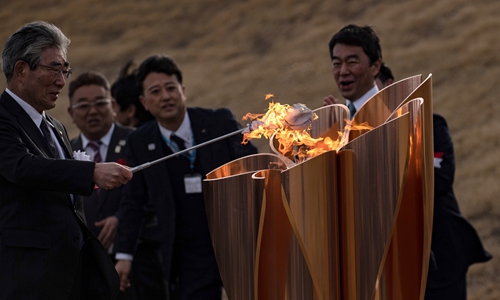HOME >> SPORTS
The ‘cursed Olympics’
Source:Reuters Published: 2020/3/22 17:48:40
Organizers quietly plan for potential delay: sources

The Tokyo 2020 Olympic flame is displayed at Ishinomaki Minamihama Tsunami Recovery Memorial Park in Ishinomaki, Japan on Friday, after its arrival from Greece. Photo: AFP
Tokyo 2020 organizers have started drafting possible alternatives to holding the Olympics this summer, two sources familiar with the talks said, in contrast to the Japanese government's stance that postponement is not an option.
While the coronavirus outbreak has disrupted sports events around the world, Japan has been steadfast in saying that the Games will go on. The top government spokesman on Wednesday said Tokyo wasn't preparing for postponement.
Prime Minister Shinzo Abe has staked his legacy as Japan's longest-serving premier on the Games and is hoping for a boom in tourism and consumer spending. At risk is more than $3 billion in domestic sponsorship, an Olympic record, and some $12 billion spent on preparations.
"Finally, we have been asked to make a simulation in case of a postponement," said one of the sources, an official close to the organizing committee who is involved in drafting the scenarios.
Both sources spoke on condition of anonymity because they were not authorised to speak to the media.
"We are making alternative plans - Plan B, C, D - looking at different postponement time-frames," said the official, adding the scenarios included cost estimates for different delays.
Neither Tokyo 2020 organizers nor the International Olympic Committee (IOC) immediately responded to a request for comment.
The options, which include scaling back the Games or holding them without spectators, would be debated by the organizing committee at the end of March, the official said.
The second source, who is also close to the Tokyo 2020 organizing committee, confirmed that postponement was being discussed, including delays of one or two years.
Some organizing staff were holding out hope for a delay of a month or 45 days, said the official involved in drafting the scenarios. A final decision on postponement will have to come from the IOC but Japan's stance also matters.
Board concerns
The IOC and its powerful chief, Thomas Bach, say the Games will go ahead as planned, drawing fire from athletes who say that could be a health risk.
Two other insiders, both senior members of the Tokyo 2020 organizing committee, echoed those concerns. One of them, a board member of the organizing committee, said the decision to postpone should be made quickly.
"The more they push the decision away ... more and more preparations have to be made - this will cause cancellation fees to go through the roof," the board member said.
Bach recently appeared to shift his tone, saying the IOC was "considering different scenarios."
Japan's Nikkei newspaper said in a report on its website on Sunday that the IOC will hold a board meeting this week, as calls from sporting organizations for the event to be postponed gathered pace.
The official involved in drafting scenarios said a long delay could spark complaints from older athletes and require keeping sponsors on board for longer. Another headache is the Olympic village, due to be converted to flats after the Games.
The summer 2021 calendar is already crowded while 2022 will see the soccer World Cup and the Beijing Winter Olympics.
Japanese sponsors are nervous, company representatives have said privately. Major sponsors include Toyota Motor Corp and Panasonic Corp.
"Of course companies are individually discussing what to do," said a representative of one of the more than 60 sponsors. "No one wants to be the first to say anything about the possibility of a postponement."
Japan Airlines Co discussed that there was an 80 percent chance the Olympics would not be held as scheduled on a recent internal conference call, a person briefed on the call said.
A JAL spokesman said, "Our preparations are underway for the Games to open as scheduled."
In Tokyo, there is a sense delay may be inevitable. Finance Minister Taro Aso has compared Tokyo 2020 to the 1940 Olympics canceled by World War II, and the boycott of the 1980 Moscow Games. "It's a problem that's happened every 40 years," he said. "It's the cursed Olympics - and that's a fact."
Posted in: OLYMPICS